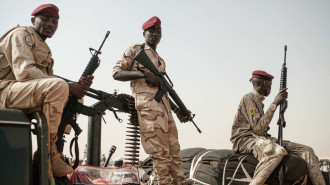How do Moroccan Jews feel about Israel's new war on Gaza?
In the wake of Israel's new war on Gaza, many within the Moroccan Jewish community feel "ashamed" and traumatised by what they describe as atrocious violence committed by Israel in the name of their faith.
"Violence only leads to more violence. The war has to stop, and the solution is decolonising Palestine," said Alia, who preferred keeping her identity anonymous, as did all who spoke to The New Arab for this article.
Alia, a Moroccan-French Jew, says her anti-Israel positions have put her under criticism by some fellow members of the Jewish community and led to heated debates in her neighbourhood's synagogue.
"While little Jewish Moroccans take the same pro-Palestine stance as me, I have never met someone who was okay with what Israel is doing now," added Alia in her interview with TNA.
Morocco was once the thriving heart of a large community of Jews, estimated at a quarter a million.
Between 1940 and 1960, more than 300,000 Moroccan Jews left for Israel. Today, about one million Jews of Moroccan origins live in Israel.
Over the years, most of the Morocco-based community, amounting to around 2,000 today, leaned more toward an apolitical position.
But whenever Israel launches a new attack on Palestinians, which is often, Moroccan Jews find themselves caught in the crossfire.
"I am Jewish Moroccan, and not Israeli. So why am I supposed to make an official statement about Israel?" David, a Moroccan-Jewish based in Marrakech, said on why he did not want to comment further on "traumatising events."
Meanwhile, other Jewish Moroccans feel a strong responsibility to speak out against what they describe as atrocities Israel is committing in their names and the name of their faith.
"We were the victims of violence once, and we should not do that to other people now that we have the power," said Sarah, a Moroccan-Jewish woman based in Casablanca to TNA.
"Both Hamas and Israel are recklessly putting the lives of civilians in danger. The solution is diplomatic discussions," argued Sarah.
Sarah, like many other Jews in Morocco, fully supports the Abraham Accords and perceives it as a tool that signatory countries could use to push for peace talks between Israel and Palestine.
In 2020, when Morocco signed the normalisation accord with Israel, Rabat said the step would solidify its commitment to the Palestinian cause as it would emphasise its role as a mediator and advocator for the two-state solution.
However, amid the ongoing event, Rabat has maintained a lukewarm position so far, condemning both sides for the violence and keeping a distance from the unfolding war in Gaza.
While the majority of Moroccan Jews prefer maintaining a low political profile, Rabat is home to some renowned pro-Palestine activists of Jewish descent like Sione Asidon, the head of the boycott movement BDS Morocco.
Over the years, Assidon, a human rights activist and democracy advocate, has become a leading figure of anti-normalisation - even way before establishing official ties between Rabat and Tel Aviv.
"The normalisation leads straight to a dead end. The previous experiences of Egypt and Jordan show that there is nothing to expect from a collaboration with a colonial state," said the activist.
Today, the seventy-four-year-old man continues his fight against normalisation, leading most of the protests demanding the closure of the Israeli office in Rabat.
On 7 October, the Palestinian armed resistance group Hamas launched an attack that took Israel by surprise. Its fighters overran Israeli military installations and settlements, which led to the death of some 1,400 Israelis.
Hamas has said its "Al-Aqsa Flood" attack was motivated as a culmination of long-building anger over Israeli policy, including recent outbreaks of violence at the Al-Aqsa mosque in Jerusalem, but more generally over the treatment of Palestinians and the expansion of Israeli settlements and thousands of Palestinian prisoners held in Israel.
Israel responded by launching another war on Gaza, imposing a complete blockade, and relentlessly bombing civilian buildings and infrastructure. More than 8,500 Palestinians – most of them women and children - have been killed by Israel's indiscriminate bombing of the Gaza Strip since 7 October.
Since then, from Glasgow to Washington, hundreds of Jewish people took to the streets over the past few days, chanting "not on our name" and for an immediate ceasefire.







 Follow the Middle East's top stories in English at The New Arab on Google News
Follow the Middle East's top stories in English at The New Arab on Google News
![Lebanon after strikes [Getty]](/sites/default/files/styles/image_330x185/public/2184409977.jpeg?h=a5f2f23a&itok=7wpfQMyI)
![G20 Brazil [Getty]](/sites/default/files/styles/image_330x185/public/2184389194.jpeg?h=a5f2f23a&itok=t1DchCMY)
